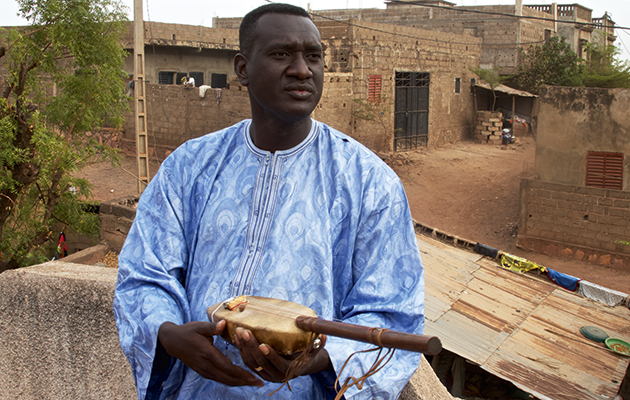The ngoni isn’t much of an instrument to look at. Four strings, traditionally cut from lengths of fishing line, are pulled across a hollowed-out, canoe-shaped piece of wood with dried animal skin stretched over it like a drum. The neck is a fretless length of dowel and the entire instrument is barely two feet long. Its basic sound is gut-bucket raw and earthy, like a rudimentary banjo, the raspingly plucked notes possessing none of the stately elegance of its sophisticated multi-stringed cousin, the kora.
The ngoni’s simplicity has made it the most ubiquitous instrument in West African music for centuries, but it wasn’t until the new millennium that Bassekou Kouyaté realised its wider possibilities and began to revolutionise its sound. After a conventional apprenticeship backing desert blues guitar maeastro Ali Farka Toure and kora poet laureate Toumani Diabate, he launched his solo career with 2007’s Segu Blue. For the first time the snapping strings of the ngoni, loaded with crisp, rapid melodies and funked-up cross-rhythms, were located at the centre of the sound. Indeed, Kouyate’s band featured four interlocking ngonis and when he added electric pick-ups, distortion and effects pedals, he was inevitably dubbed the Hendrix of his instrument. Segu Blue won album of the year at the BBC Radio 3 world music awards and the follow-up, I Speak Fulani, (2009) was nominated for a Grammy.
Yet for all Kouyate’s innovations, his first two albums were still essentially traditional African records, aimed primarily at the specialist world music market. His third album, 2013’s Jama Ko, was a significant advance, rocking and grinding harder with a full-throttle roar, a conscious intensification driven by a new, younger band that included two of his sons, and lent a defiant edge by the desperate times in which it was recorded, with Mali in lockdown as Islamic fundamentalists overran its northern territories and imposed a ban on music.
Ba Power feels like another dramatic leap forward and a further landmark in the integration of African tribal rhythms and western rock’n’roll, pioneered by Damon Albarn’s Africa Express and which reached something of a high tide last year on Robert Plant’s lullaby…and the ceaseless roar. The parallel with that record is more than figmental: Dave Smith, drummer with Plant’s Sensational Shape Shifters, plays on almost half of the tracks and, alongside more traditional calabash percussion, drives them with pneumatic power.
Further rock’n’roll heft is provided by guitarist Chris Brokaw (Lemonheads) and the dynamic production of Walkabouts’ veteran Chris Eckman. But this is no corporate western takeover and the non-African contingent has a perfect understanding that its role is to augment Kouyate’s Afro-rock vision rather than to adulterate it.
Opener “Siran Fen” establishes the template, as Kouyate’s amplified ngoni duels thrillingly with Brokaw’s lead guitar over a propulsive rhythm and call-and-response vocals led by the intense, keening voice of Kouyate’s wife, Amy Sacko. On “Aye Sira Bla” a tribal praise song is piloted into Afro-prog territory with the assistance of Jon Hassell’s trumpet and keyboards. “Fama Magni” is another traditional African melody, featuring haunting single-string fiddle (an instrument prominent on lullaby… and the ceaseless roar) and with Samba Toure (whose recent Glitterbeat album Gandadiko is also worth exploring) adding modal lead guitar lines that contrast strikingly with Brokaw’s more chromatic playing elsewhere.
On the pulsating “Waati”, Kouyate’s ngoni spills shards of distorted notes over a razor-sharp riff that builds to a hypnotic climax and suggests the Hendrix analogy is not an idle one. Finally the rollicking swagger slows to a rolling strut on the melodic “Te Duniya Laban”, an infectious Afro-pop anthem as Sacko sings of the transitory nature of life over a chiming chorus and the shimmering strings of Eckman’s acoustic guitar and Kouyate’s more brittle notes. The album ends moodily with “Bassekouni”, an Ali Farka-styled after-hours blues jam that fades tantalisingly after three minutes and leaves you gazing wide-eyed into the desert night and craving more.
Q&A
Bassekou Kouyaté
The kora is well known outside Africa, the ngoni perhaps less so. Can you tell us about your instrument?
It’s the oldest instrument in west Africa. I learnt to play from my father and he learnt to play from his father and it goes back centuries. It’s the family mission and now my sons are playing with me. That has changed the sound because the younger generation bring something new.
How do you feel the sound has changed?
I always tried to extend and develop the ngoni for our times. But on the last two records I wanted to bring in the energy of rock’n’roll. This album definitely has the toughest sound I’ve ever made.
As an African musician do you feel an empathy with western rock’n’roll?
They say rock’n’roll came from the blues and that the blues came from Africa. The first time I met Taj Mahal he said I was playing the blues. I didn’t know the blues; I was playing African music. So it must be true.
You’ve collaborated with a lot of non-African musicians now. Is that something you relish?
I’ve enjoyed making music with all of them. Playing with Paul McCartney and Damon Albarn on Africa Express was fantastic. But the one western musician who really stands out for me is Bela Fleck. The American banjo and the ngoni are close cousins, so we have a special understanding.
INTERVIEW: NIGEL WILLIAMSON



